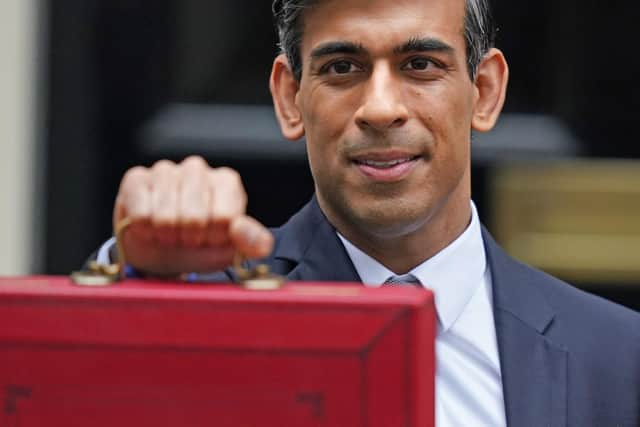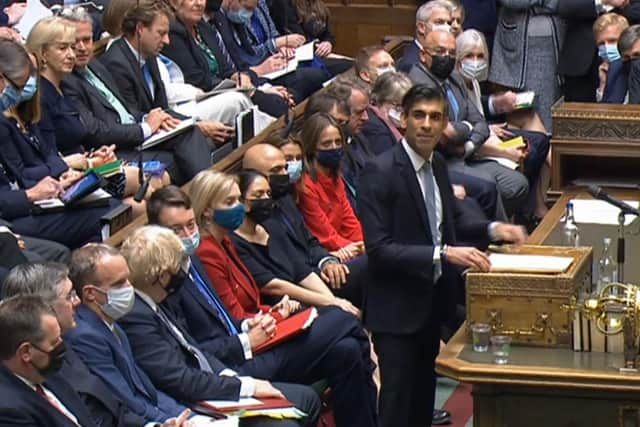Autumn Budget 2021: 10 ways Chancellor Rishi Sunak's Budget impacts Scotland
Chancellor Rishi Sunak insisted that he had delivered a Budget “for the whole of the UK”.
Overall, he said that through the Barnett formula – the mechanism used to calculate money allocated to the devolved nations when more spending is given to England – the Budget had increased funding to the Scottish Government by £4.6 billion, a figure which he said was the “largest public grants for Scotland and the other devolved nations since the devolution settlements of 1998.
Advertisement
Hide AdAdvertisement
Hide AdA total of £170 million is to be allocated to Scotland as part of the government’s “levelling up” fund, including a project in Aberdeen, Mr Sunak said – more than the Barnett Formula consequentials from the total fund for bids of £170m.
Mr Sunak announced a rise in the National Living Wage from £8.91 per hour to £9.50, to come into effect from 1 April next year. The rise is a 6.6 per cent increase in the minimum wage for all those aged 23 and over - more than twice the current 3.1 per cent rise in the cost of living. On a typical 40 hour week, the new minimum wage amounts to a salary of £1,646 per month or £19,760 a year.
Funding has been allocated for electric off-road racing series, the Extreme E championship, which is set to be held in the Western Isles and the 2022 Hebridean X-Prix in the Outer Hebrides.
£560 million has been allocated to a new UK-wide maths skills scheme, Multiply. The project will allow up to 500,000 people across the UK to receive free personal tutoring or digital training in maths.


Flights between UK airports after April 2023 will have a new, lower rate of air passenger duty tax, which Mr Sunak says will see 9m passengers have duty cut by half and “bring people together across the United Kingdom”. He said it would be a boost to regional airports like Aberdeen. Long haul flights over 5,000 miles will have a higher rate.
The government has announced that England's city regions will receive £6.9bn to spend on train, tram, bus and cycle projects – while this will not directly involve Scottish routes, through the Barnett formula, extra funding will be allocated to Scotland for transport.
Mr Sunak said the Scale-Up Visa system will make it quicker and easier for fast-growing businesses to bring in highly-skilled individuals and help "identify, attract and relocate the best global talent in key science and tech sectors".
The Budget unveiled what Mr Sunak called the “most radical simplification of alcohol duty in 140 years”. The planned increase in duty on Scotch whisky will be cancelled. The government will slash the main duty rate from 15 to just 6 per cent. Some drinks, such as white cider, will see a small increase in rates, while lower strength beers and wines will pay less. Small brewer relief will be extended to all small alcohol producers of drinks less than 8.5 per cent alcohol. Meanwhile, a lower rate of duty – cutting duty by 5 per cent - will be levied on draught beer and cider, cutting the price of a pint by 3p, in a boost for pubs.


Advertisement
Hide AdAdvertisement
Hide AdThe planned rise in fuel duty was also cancelled in a saving of £8 billion. The average tank of fuel will cost around £15 less per car.
Universal Credit taper – which sees the benefit reduced when someone starts to work – will be cut by 8 per cent to 55 per cent, more than was expected ahead of the announcement. Mr Sunak described it as a “tax on working people” and said the cut would be worth over £2 billion, which will see some families benefit by £1,000 a year. The cut will be introduced by 1 December.
A message from the Editor:
Thank you for reading this article. We're more reliant on your support than ever as the shift in consumer habits brought about by Coronavirus impacts our advertisers.
If you haven't already, please consider supporting our trusted, fact-checked journalism by taking out a digital subscription.
Comments
Want to join the conversation? Please or to comment on this article.
